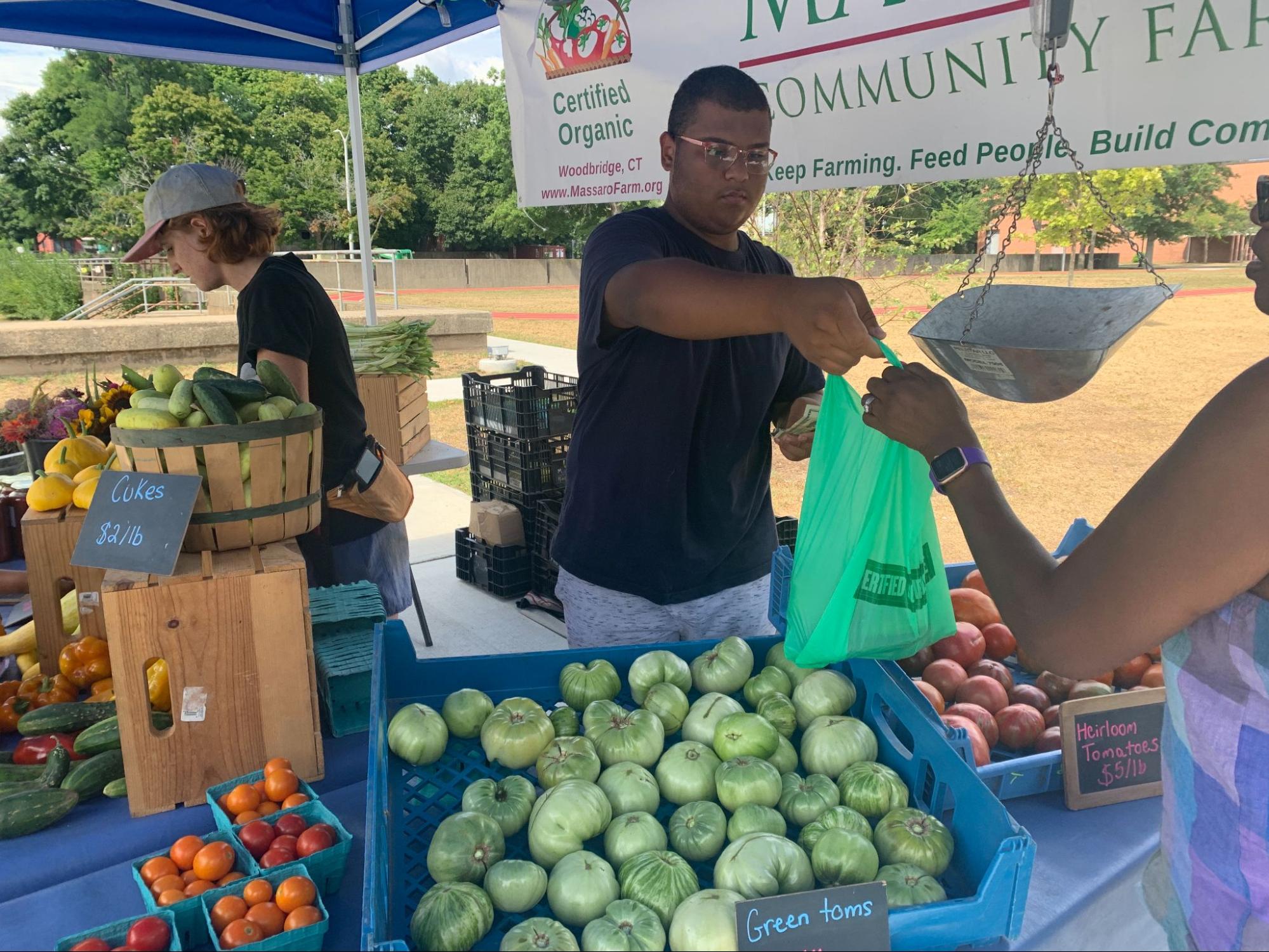New farmers market brings fresh local produce to the Dixwell community
The market, which operates every Wednesday from 3-6 p.m. in Daniel Stewart Plaza, offers Dixwell residents easy and affordable access to food products from local farms and small businesses in New Haven.

Courtesy of Frankie Douglass
CitySeed and Q-House, two community organizations in New Haven, have partnered to open a new farmers market in the Dixwell neighborhood featuring local vendors and providing customers with fresh produce at discounted prices.
The market, which will run every Wednesday until late October from 3 to 6 p.m., opened outside of the Q-House in Dixwell in June of this year. Vendors have consisted of a number of small businesses and local farms. Last week, there were three vendors present — Massaro Community Farm, Beckett Farms and Pedals Smoothie and Juice Bar. A typical week sees about 90 to 250 customers visit. According to Sandy Flores, the assistant market manager at CitySeed, the Q-House Farmers Market is an important way to bring fresh produce to people in New Haven who come from low-income backgrounds.
“With the market, we are hoping to expand affordable healthy food options in [Dixwell], as well as encourage local entrepreneurship,” said Nicole Jefferson ’22, who serves as communications coordinator at LEAP, a youth education-focused organization that is located at Q-House, and who oversees publicity for its market. The market’s goals align with the missions of LEAP and Q-House, Jefferson said, because it “utilizes the [Q-House] plaza in a way that brings people together.”
The market is also important to Jefferson because it exposes New Haven residents to resources they might not have access to otherwise.
Flores echoed Jefferson’s sentiment. She explained that the Q-House Market accepts various forms of food stamps — including SNAP coupons and WIC checks — which allow customers to take home the fresh food sold at the market at reduced prices. According to Karen Comstock, a CitySeed volunteer who works with Flores, SNAP discounts are doubled when spent on produce. The market being situated in Dixwell is very helpful, Comstock said, because there are a lot of people there who come from low-income backgrounds and are SNAP users.
According to the Newhallville and Dixwell Neighborhood Community Index, 2,321, or 55 percent, of Dixwell residents are considered low-income.
Gail Brown, a resident of the Hamden community and a participant in both the SNAP and WIC programs, attends the Q-House Farmers Market every Wednesday because of the fresh produce and the discounts provided.
“I take three buses to get here. But I’m here every Wednesday, because I have the vouchers and the coupons and I can use my WIC and SNAP programs,” Brown told the News. “It’s good that they’re doing this right here in the community. The customers are mainly low-income people, so this is good because we’re getting local, healthy stuff. I could go to the store and get packaged stuff for reduced prices too, but here, I’m getting it fresh. And that’s better for me.”
In addition to creating equitable access to locally grown food, another mission of the CitySeed Q-House Farmers Market is to promote local farms and small businesses in New Haven. Jefferson explained that CitySeed runs a program called Collab, which teaches a course on food business to New Haven entrepreneurs. Some graduates of the Collab program are vendors at the new Q-House Market.
Kismet Douglass is a Yale chef working in the Schwarzman Center, a graduate of the CitySeed Collab program and the owner of Momma Kiss Kitchen Cuisine, a small catering business which has vended at the Q-House Market in the past. Douglass described the market as a great experience.
“I got a lot of exposure, and I was able to contribute to the farmers there,” she told the News. In the future, Douglass hopes to hold cooking demonstrations at the market, which she hopes will help educate customers about “what they can make with the goods the vendors are selling.”
Small scale Connecticut farms are also intended beneficiaries of the Q-House market. According to Jefferson, the two recurring vendors at the market are Massaro Community Farm in Woodbridge and Beckett Farms in Glastonbury.
“One of our guiding values as a farm is food access, and of course that is not an easy value to align with as a small agricultural establishment,” explained Cass Friend, an employee at Massaro Community Farm who works at their Q-House stand. “Our farm system is not set up for small scale agriculture to survive, let alone to do so in a way that gives access to all people of all socioeconomic backgrounds. So this market is a really good opportunity to align more with our mission of food access.”
Despite their appreciation for the goals of the Q-House Market and the exposure it brings them, Douglass and Friend both pointed out that the small size of the market presents some financial difficulties for their businesses. Douglass explained that the Q-House market sees less foot traffic than the other CitySeed farmers markets because of its infancy and location. Friend emphasized the challenges of selling her produce to small crowds.
Still, Friend and Douglass remain committed to their mission, and are optimistic about the market’s future. “It’s hard, because we’re so pinched as farmers, yet so many people get into this type of work because we believe that everybody should have the right to healthy, locally grown food,” Friend explained. “I hope that this market can be a part of making that doable for Connecticut’s small scale farmers and communities as well.”
The Q-House reopened in November 2021 after an 18 year hiatus.







